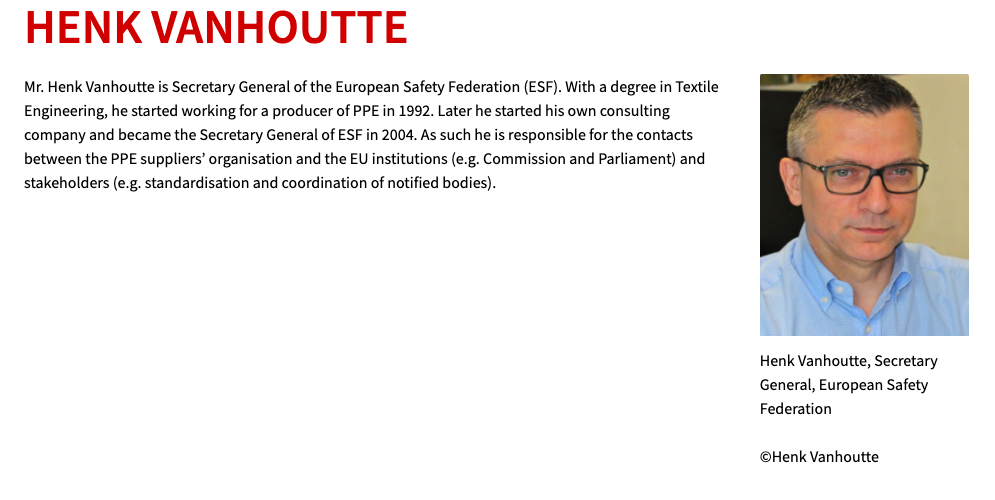
Vi ställde några aktuella frågor till Henk Vanhoutte, generalsekreterare i ESF.
Vanhoutte: Samarbete med alla berörda intressenter är viktigt
En av de viktigaste erfarenheterna för PPE-industrin under Coronapandemin är att samarbeta med alla berörda intressenter. Det säger Henk Vanhoutte, generalsekreterare för the European Safety Federation (ESF). Han gästade NSA:s årsmöte tidigare i år och vi ställde några aktuella frågor till honom med anledning av den andra våg av Covid-19 som nu sveper över världen, inte minst i Europa.
How concerned are you that PPE will be used and satisfy the demand that Europe – and the rest of the world – as a result of a second wave?
The PPE supply chain certainly still has challenges. Even if the production capacity for several types of PPE has been increased significantly since the beginning of this year, for some types (e.g. disposable gloves), it takes longer to be able to increase the production capacity. So while for some types of products the situation is less critical, for other products the situation is still very difficult. This is not only valid for Europe but is a global status. So it is certainly essential to use PPE wise and correct and make sure that those that need them have access to the products. This is certainly for the healthcare sector and linked professionals. But the PPE used for the healthcare are not specifically designed for this sector and are typically used in several industry sectors, so it is important that the industry continues to have access to these PPE, so that they can protect their employees as needed. Looking at alternative PPE with the same or even higher protection levels must be encouraged, in most cases that means also more sustainable products than the many disposable PPE that are currently used.
How has the industry coped with the demand in your opinion?
The specialised industry and their suppliers of raw materials have worked very hard to increase the existing production and have in my opinion done a tremendous job. The production in Europe has been increased significantly but is certainly not enough to supply the needs in Europe. On the other hand there are also a significant number of newcomers on the market (both producing in the EU or outside the EU). Some of them are working to make sure they can produce high quality PPE that are also fully compliant with the applicable EU legislation. But some of the newcomers offer products that are not fully compliant, and that needs of course to be stopped by market surveillance authorities.
Which are the most important experiences the industry has learned since the first wave of covid-19?
Cooperation with all concerned stakeholders is certainly essential. And there is a huge lack of knowledge/expertise in the market, certainly at the purchaser’s level. Being an expert on virology does not make someone an expert on PPE, and being used to import coffins from China does not make an importer capable of importing PPE. Strong market surveillance is essential, also in times of crisis. Training at all levels is crucial. As well as risk analysis in the healthcare sector (from the point of view of the employee and not only from the point of view of the patient). In the beginning most healthcare workers did not have the knowledge about how to use the PPE correctly – this was a waste of material, but also put people at risk while thinking they were protected.
Having strategic stocks of certain products is certainly necessary, however, these stocks must be properly managed to make sure that, when needed, the products are in good condition to be used (e.g. expiry dates of products, correct storage conditions). For this, cooperation between authorities and industry (manufacturers and distributors) is necessary, but also coordination on European level to make sure that, when necessary, the stock available in one member state can also be used in another member state.
In terms of the supply chain, it has become clear that too high regional concentration of production for a product is not the best solution in times of crisis. Lockdowns and closing borders have created serious problems. This includes not only final products, but also materials. And the logistics must be kept available (transport of products was at sometimes problematic). It is important to have a good view on the complete supply chain and make sure the complete chain can continue to work.
Transparency is also important. Still today, it is as good as impossible for the industry to get a view on the real needs in the healthcare sector, this due to national authorities not always sharing their information.
The big demand of PPE led to many less accurate people selling false PPE. What should the industry do to regain buyers’ trust?
The specialised PPE suppliers must continue to offer good service (certainly correct information, but also correct products) to their customers. Most industrial users have fairly good knowledge and continue to trust their suppliers. Offering less quality or non-compliant PPE is certainly not a good idea for specialists. And working together with the sector associations to give clear neutral information, to support market surveillance, to train both suppliers and customers is an important aspect.
And of course, continue to innovate. A crisis is always a momentum for innovation.
Can the industry cope with the world’s demand now and in the future?
The industry continues to work hard to be able to cope with the demand. One of the problems is predicting the future demands. Questions about possible over-capacity for certain products and materials do raise already, even if not immediate. What will be the influence on the market if that happens indeed.
NSA, Box 22 307, 104 22 Stockholm | Telefon: +46 (0)708-97 67 56
Powered by Brasab